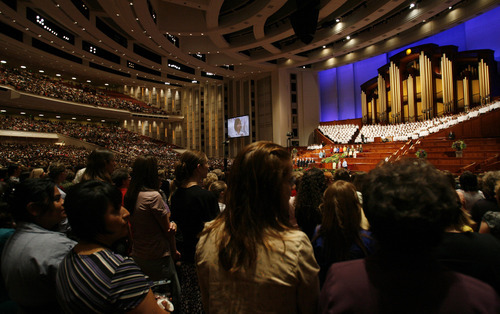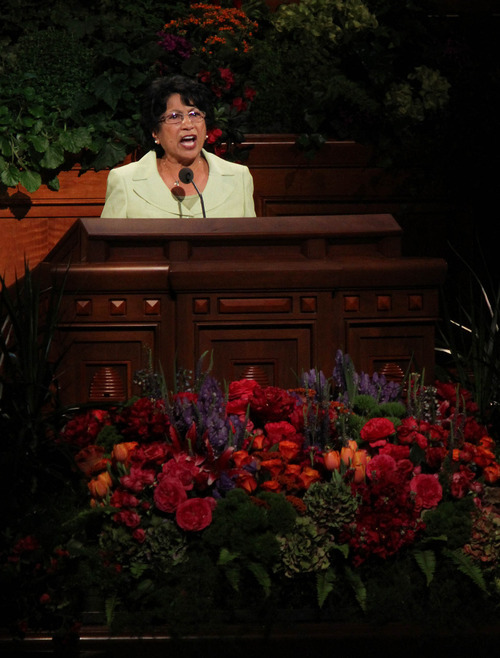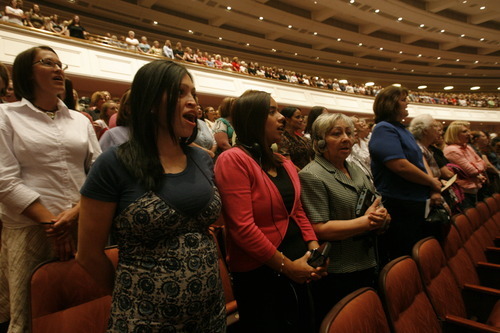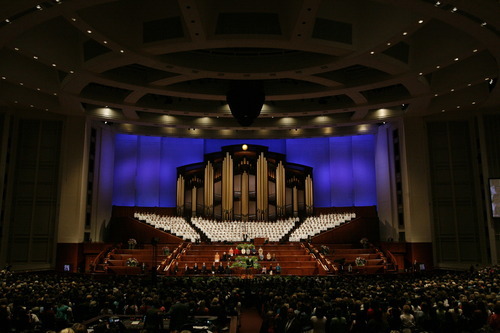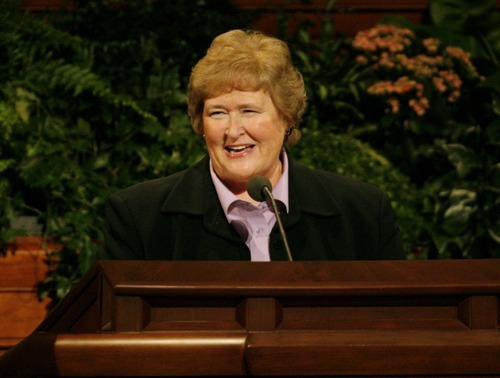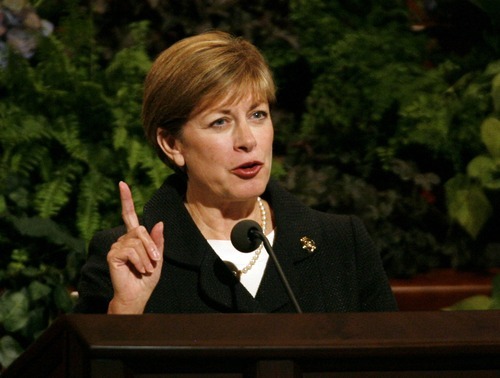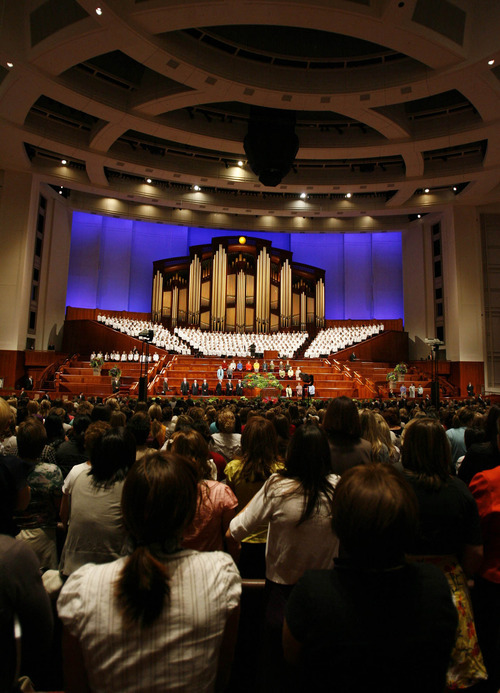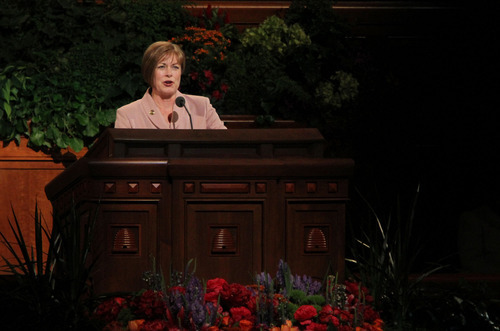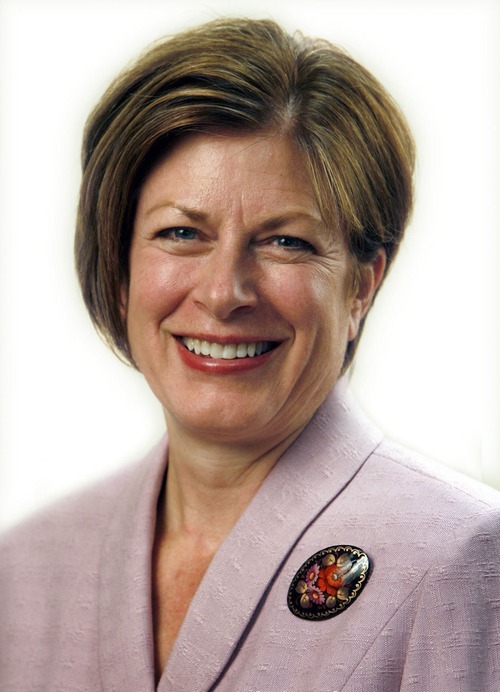This is an archived article that was published on sltrib.com in 2012, and information in the article may be outdated. It is provided only for personal research purposes and may not be reprinted.
LDS General Relief Society President Julie B. Beck understands the power of the past to transform the future.
Witness Beck's crowning achievement in the five years since she took the helm of Mormonism's global women's organization. It is not an innovative, jazzy new program or politically progressive language on women's issues.
Instead, it is a short, simplified book about women in Mormon history, Daughters in My Kingdom, distributed free to every adult female in the 14 million-member Church of Jesus Christ of Latter-day Saints and the Internet publication of minutes from the society's 1842 founding.
Both efforts have given modern LDS women strong, resilient and somewhat unconventional role models from their history to emulate and from which to draw strength. And they have revealed a pronounced spiritual equality between men and women in early Mormonism.
It was Beck, working with church historians and leaders, who pushed the project to completion. And, in recent speeches, she has reiterated the belief that, although only men hold the faith's priesthood, both sexes have access to that priesthood's spiritual powers.
"What the Lord envisioned regarding [male priesthood] quorums and [female] Relief Societies has not yet been fully utilized," Beck said at a Brigham Young University devotional in January. "Many quorums and Relief Societies are at present much like sleeping giants waiting for you to breathe new life into them."
Few would have predicted that bold direction of Beck's presidency from the beginning. After all, it started with a controversial speech many saw as a step backward.
Maybe, though, critics weren't paying attention to the seeds she quietly was sowing.
—
Uncommon childhood • Beck, one of Grant and Geraldine Bangerter's 11 children, spent five years of her youth in Såo Paulo, Brazil, where her father was an LDS mission president. Young Julie learned Portuguese, the value of hard work and a love of the Utah-based faith as it is experienced in far-flung locales. She saw devotion amid poverty and joy among converts who found their way into the American-born church.
After moving back to Utah and graduating from Brigham Young University with a degree in family science, she married Ramon Beck — a renowned jokester, friends say — and together they reared three children. In 2002, Beck was tapped to serve in the General Young Women's Presidency and then, in 2007, she became the 15th president of the Relief Society (a president typically serves for five years).
Symbolizing her awareness of the growing needs of a worldwide church, Beck chose as her two counselors Silvia Allred, who is originally from El Salvador, and Barbara Thompson, a single woman.
Then came Beck's first speech in LDS General Conference.
Titled "Mothers Who Know," it triggered an avalanche of negative responses. Some conservative women felt inadequate ("Latter-day Saint women should be the best homemakers in the world"), and some liberals felt it described rigid gender roles of housekeeping and nurturing. Within days, the Mormon blogs were aflutter with critiques and counterarguments. An LDS group published a response they called "What Women Know," stressing more inclusive language in which men and women are responsible for nurturing, child care and spirituality.
In the aftermath, Beck reached out to bloggers, listening to them, answering their questions privately and engaging them in conversation.
But she didn't regret the speech.
"Sometimes people like to pick things apart that general leaders say. I don't get angry," Beck recently told LDS Living magazine. "Sometimes I feel sad — mostly for them — and I pray for them and I worry about them and their personal struggles that are causing them to feel some kind of discomfort or misalignment with how things are done."
And she powerfully defended her right to speak her mind.
"I'm assigned to be here, and I speak for the Lord," Beck told the magazine. "I assist prophets, seers and revelators who have specific assignments. They are the ones who set me apart for this calling, so when I speak, I speak in that way — as a general leader of the church."
She has taken that confidence with her as she jets across the globe, meeting with and celebrating the strength of Mormon women under her charge.
—
Travels and challenges • One of the genuine pleasures of Beck's assignment, she says in an email to The Salt Lake Tribune, has been "to see and experience firsthand the strength and capacity of the women of this church."
She mentions, for example, being deeply moved by a Relief Society president in Pisco, Peru, who organized relief efforts after a devastating earthquake.
"While others took care of temporary shelter and cleanup, she organized the feeding of all the people gathered at the church. Then she coordinated outreach into the community, providing assistance to families who had lost all baby-care items," Beck says. "Finally, she organized the sisters to improve their self-reliance by teaching them new skills and creating opportunities for them to begin earning income again."
Efforts such as these, she says, are "the heart and essence of the Relief Society — to lift up the hands that hang down, offer comfort to those who are suffering and bring hope to hopeless situations."
Beck also was part of the leadership team that last year reorganized congregations for LDS singles, hoping to improve the worship experience for unmarried Latter-day Saints, especially women.
"I see an increasingly youthful Relief Society," she writes in the email. "Every year 50 percent of the adult women baptized in the church are between the ages of 18 and 30."
In fact, Beck told LDS Living, "worldwide, the majority of [all] women in Relief Society are under the age of 30. About half of all women are single, and many of the rest will probably be single at some point for one reason or another."
But not everyone in the younger generation connects with Beck and her message.
"I see a wariness from some young women that seems to stem from the perception that Beck is preaching to a choir of 'women who know,' women who have already settled it in their hearts to choose marriage, motherhood and gender-specific responsibilities within those roles," says Aimee Hickman, on the board of Exponent II, a magazine for Mormon women modeled after the 19th-century Woman's Exponent. "Many young LDS women who either don't fit in with or question the fixed nature of those roles wonder whether there is a place for them in the church."
Beck's presidency has been friendly to women who "through no fault of their own" have been unable to secure the life of a "woman who knows," Hickman writes in an email from her Baltimore home. Her messages have felt "less friendly to women who are uncomfortable with aspects of that worldview."
Some of those young women tell Hickman that Beck's approach "can leave them feeling unworthy or unwelcome."
A sense of exclusion and inadequacy is the opposite of what Beck intends, the president says.
"It is exciting to see the strength of younger women. They, of course, like everyone, have their challenges, but they have grasped their purpose and potential," Beck writes in the email. "Their enthusiasm and vision will be a blessing to the church going forward, and I look forward to seeing what their influence on the church and the world will be."
She hopes this generation will carry with them the vision of their ancestors — that women have divine significance in their lives and in the Relief Society.
And she has a book to prove it.
—
We're all daughters • That book, Daughters in My Kingdom: The History and Work of Relief Society, written by Susan Tanner, builds on the work of earlier Mormon historians.
It is meant to be accessible to all church members, easy to read and pleasant to view. Beck even pushed for a larger-than-normal size so that "a mother with a baby on her lap could read it without having to use two hands," says Mormon women's studies scholar Jill Mulvay Derr, recently retired from the LDS Church history department.
In the book and in her speeches, Derr writes in an email from Frankfurt, Germany, Beck addresses "women's relationship with God, the essential nature of women's responsibilities in carrying forth [God's] work and the fullness of blessings promised to all who keep their sacred covenants."
Beck's starting place "has never been women's problems," Derr says, "but women's possibilities."
Many Mormon women — young and old — see the book as a valuable effort.
"It was a brilliant choice," says Pulitzer Prize-winning LDS historian Laurel Thatcher Ulrich, who teaches at Harvard. "There is a real hunger, especially among younger women, for learning about the history of women in the church. The idea of producing a short, easy-to-read account of women in church history and to acknowledge the author and others who did the research seemed to me pathbreaking."
Emily Clyde Curtis, another board member of Exponent II, agrees.
"We can't add women into the scriptures, but we can celebrate the strong and courageous women in our history," says Curtis from Phoenix. "In a time when it feels like so many young women are leaving the church, I wonder if having more women as spiritual role models can help stem the tide."
For Jonathan Stapley, who has studied the gift of healing among early Mormon women, Beck's use of history is groundbreaking. But, he says, it likely won't be fully appreciated for many years.
"Her efforts to infuse the organization with its founding narrative and theology hark back to the early 20th-century presidency of Emmeline Wells," Stapley writes in an email from his Seattle home.
Wells was the last Relief Society president to have lived with the early Latter-day Saints in Nauvoo, Ill. She trekked across the Plains and helped build a new life in Utah. An outspoken advocate of women's rights, editor of the Exponent, a poet and a mother, Wells was a formidable figure.
Her presidency marked the end of an era, Stapley says. Beck's could be the beginning of a new one.
pstack@sltrib.comFacebook.com/religiongalTwitter: @religiongal


